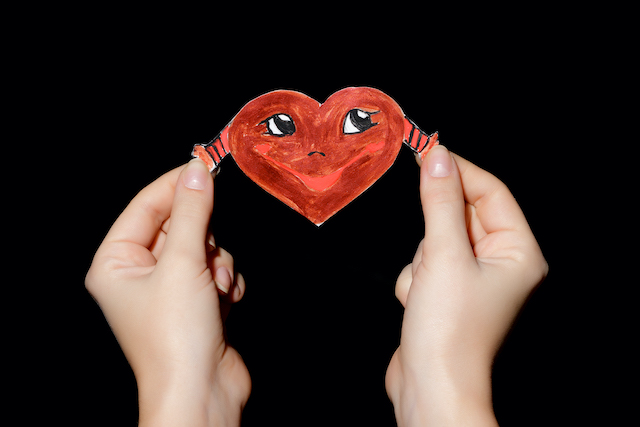
“Owning our story and loving ourselves through that process is the bravest thing that we’ll ever do.” Brené Brown
Growing up I watched my grandparents’ relationship with longing. They anticipated each other’s needs, they did small loving gestures for each other every day, and they put the other first without resentment. I longed to have a relationship like theirs one day and meet someone who understood me the way they understood each other.
In contrast, I observed the relationship between my parents. My mother was constantly in a state of panic trying desperately to please my father. Her actions were always met with contempt and criticism, and her pleas for attention and affection were ignored.
He never anticipated her needs or cared about what she wanted. He did whatever suited him, he said whatever he thought, criticized and complained constantly, rarely helped around the house, except for cooking, which he loved, and he always got his way in the relationship. I did not want a relationship like that and the thought of becoming anything like my mother repulsed me.
When we are raised in a toxic environment we are often not taught how to love and value ourselves. We are not taught to stand up for ourselves or develop healthy boundaries with others. As a result, we are drawn to abusive and/ or toxic relationships because this way of being treated feels normal.
Throughout high school and university, I attracted a string of relationships that reflected my upbringing.
I formed friendships with people who used me and discarded me, who expressed their opinions, views, and values but could not care less about mine. I had employers who did not value me, and I acted passive and eager to please because I had been taught that this was the only way to be liked and valued.
I attracted romantic partners who abused me verbally and physically and treated me the same way my father treated my mother.
The people in my life would say things to me such as “I will love you if…” “I will treat you better when…” “I will only care about what you have to say if and when…”
These statements were familiar, so I accepted them without question, but I was trapped in a cycle of abuse and self-loathing. A cycle that was hurting me and holding me back from becoming the person I was meant to be.
I have learned that you cannot expect another person to love, respect, or value you if you do not love or value yourself. If you do not love yourself, you fail to uphold healthy boundaries that protect your dignity and personal value and you allow others to define you in ways that are demeaning and self-serving.
For me, self-love stated by discarding old narratives that others had told me for years. I was not worthless or incompetent. I was not defined by the grades I did not get in high school or the mistakes I made while I was learning new skills. I was not lazy. I was not going to come to a sad end or be a burden to society. I was going to do great things with my life. I was going to thrive!
If you were raised in a toxic environment you likely were taught that self-love is narcissistic, that being aware of your own needs and putting those needs first is selfish and wrong, and that you should continue to sacrifice yourself for the good of others who matter more than you.
What you need to remember is that these words were likely said to you by people who benefited from your self-sacrifice and self-hatred. There is nothing wrong with expressing your own needs, wants, and desires or setting and achieving goals that would allow you to lead a full life. You become your best self when you do these things and you are better able to help others in a meaningful way.
Once I started to love myself my life began to transform. I started to set healthy boundaries with people, and the relationships in my life began to change. People who were in my life to use me as a tool fell away, and although I was sad to lose these so-called friendships I began to attract reciprocal relationships. In social situations, I was listened to and my opinons were respected and valued for the first time in my life!
I began to get a clear picture of what my goals and needs actually are, and I started to understand myself in a way I had never done before.
When you grow up with abuse in any form you are not taught who you are. Instead, you are given a self-serving, subordinating narrative of yourself by the abuser that reflects who they are and serves their own selfish needs. If you hold on to this narrative, you can never be fully you or live up to your potential life because you are forced to be blind to your own needs and strengths.
Once I consciously choose to let go of the past narratives of others, I was free. This did not mean that I was blind to my shortcomings or that I felt entitled, arrogant, or self-important. It meant that I embraced my strengths, was compassionate with myself when I made mistakes, I was aware of my needs, and I gave myself permission to rest and reflect when I needed it.
I have learned that self-love is a process. For me, that process involved writing down what I like about myself, my past accomplishments that I am proud of, what I am good at, what I need in relationships and work environments.
It meant having the courage to walk away from relationships with people who do not respect me including members of my own family.
It involved setting myself up for success and happiness by building on my strengths while allowing myself to grow.
I got my masters, started my Ph.D., joined a competitive swim team, and helped my students and friends in meaningful ways and formed meaningful relationships with like-minded people. I took risks that have led to rewards I could never have imagined. My point here is not to brag but to illustrate that I had I not learned to love myself, I would not have been able to accomplish these things.
Let go of narratives that no longer serve you, do what you love, believe that in your abilities, and know that someone will love you for you! Self-love is a choice and one I hope you will choose on Valentine’s day and always.
About Jen Hinkkala
Jen Hinkkala is PhD student, researcher, and teacher of arts education in Canada. She strives to understand what factors and experiences lead to higher levels of wellness, resiliency, and self-care among arts educators and students. Jen is also a life coach and specializes in self-care, well-being, time management, performance anxiety, estrangement, overcoming abuse, career paths, and anxiety. Jen runs a support group for estranged adults and a group to support personal development. Follow her here: Twitter / Blog.













 Though I run this site, it is not mine. It's ours. It's not about me. It's about us. Your stories and your wisdom are just as meaningful as mine.
Though I run this site, it is not mine. It's ours. It's not about me. It's about us. Your stories and your wisdom are just as meaningful as mine.
Loved this today! Thank you!
You are most welcome!
Beautifully said. Thank you Jen! 💜
Your most welcome.